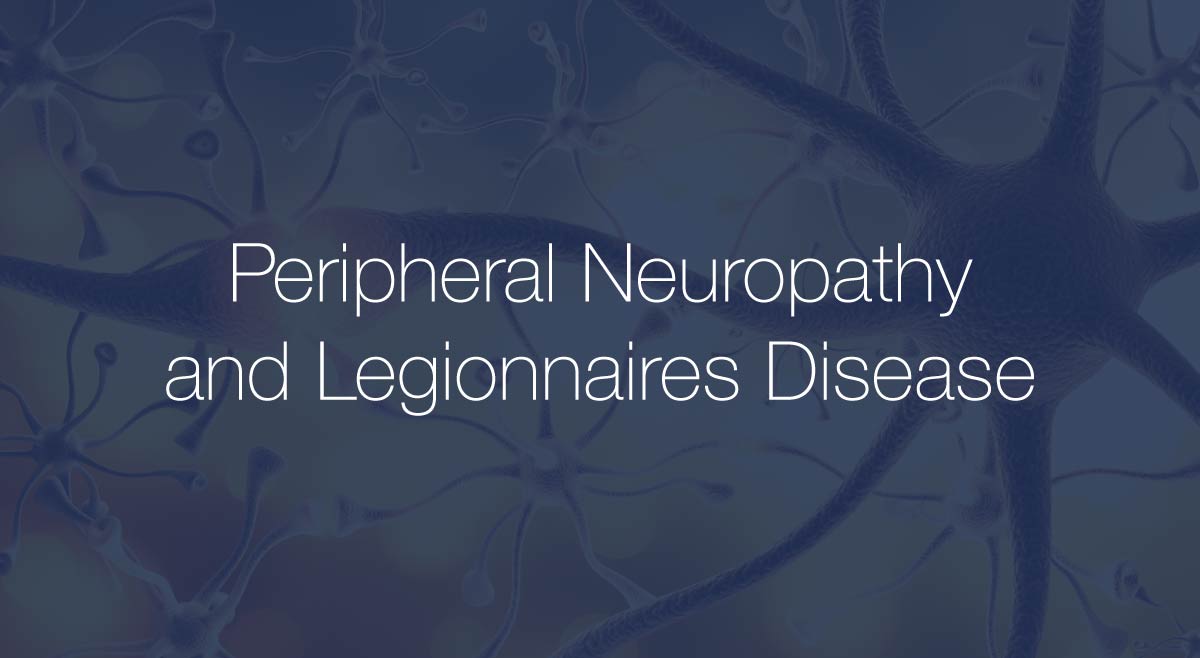Is there a link between Legionnaires Disease and subsequent peripheral neuropathy?
Many of the victims of Legionnaires’ Disease that have contacted me have described the strange feeling of numbness of the feet and hands once they are discharged from the hospital. Most have an overall feeling of fatigue, but they routinely express the feeling that their legs feel like they are asleep. That condition may likely be peripheral neuropathy.
Peripheral Neuropathy
Peripheral neuropathy is defined as damage to the peripheral nervous system — the vast communications network that transmits information between the central nervous system (the brain and spinal cord) and every other part of the body. (Neuropathy means nerve disease or damage.) Symptoms can range from numbness or tingling, to pricking sensations (paresthesia), or muscle weakness.
Diagnosing Peripheral Neuropathy with Legionnaires’ Disease
The difficulty in making such a diagnosis in a victim of Legionnaires disease may be that their treating physician, who is already likely to be overwhelmed with the severity of his patient’s Legionnaires disease, may dismiss or minimize the condition. This is not a criticism of any treating doctor over their care for the well being of the patient, but the idea that a condition of pneumonia would somehow connect with a neurologic disorder may not immediately make sense.
Medical Literature: Link Between Peripheral Neuropathy and Legionnaires Disease
Faced with a number of victims that consistently described this neuropathy of their legs, a quick medical search for such a connection was made. What the medical literature shows is that there is indeed not only a connection, but also a causal link between legionnaires disease and peripheral neuropathy. A study in the Journal of Neurology indicated such a connection. Although it concluded that the legionella likely did not effect the brain, “The most attractive mechanism would seem to be the production of an endotoxin-like agent which produces multi-organ damage.”
In another remarkable study from the Journal of Infectious Disease and Clinical Practice, the authors concluded that certain resulting patient’s quadriplegia was related to their contracting legionnaires disease. As the author’s explained, “The central nervous system involvement is common during the Legionnaires’ disease and is usually represented by a reversible, diffuse encephalopathy, which clinically occurs with headache, abnormal mentation (including mild confusion, delirium, hallucinations, drowsiness, or coma), memory disturbances, personality changes, or seizures.” Although this occurs in 30-50% of the patients, most of these tend to resolve with a regression of the legionnaires disease.
Conclusion
The authors concluded that, “Peripheral nerve involvement with sensory-motor polyneuropathy, leading to hyposthenia or paralysis in both arms and legs, is exceptionally reported in association with Legionnaires’ disease. These uncommon, peripheral neurologic abnormalities tend to persist beyond regression of acute clinical manifestation.” The conclusion is astonishing that, in rare cases, victims of legionnaires disease have also suffered not only peripheral neuropathy, but from quadriplegia. In fact while the majority of patients recover neurologically, some continue to suffer significant neurological dysfunction beyond the regression of the underlying legionnaires disease.
It is therefore important that family members and caretakers are attentive to the victim’s condition and overall symptoms from their discussions and observations. While the initial critical condition and subsequent respiratory complications are important, the secondary neurologic disease may be more problematic in the victim’s long term recovery.



